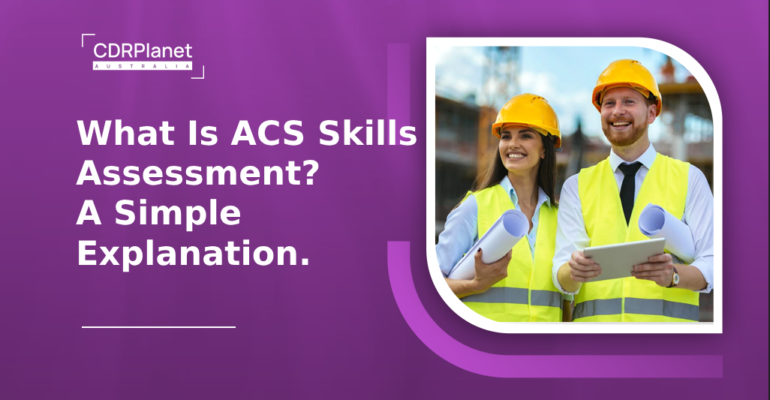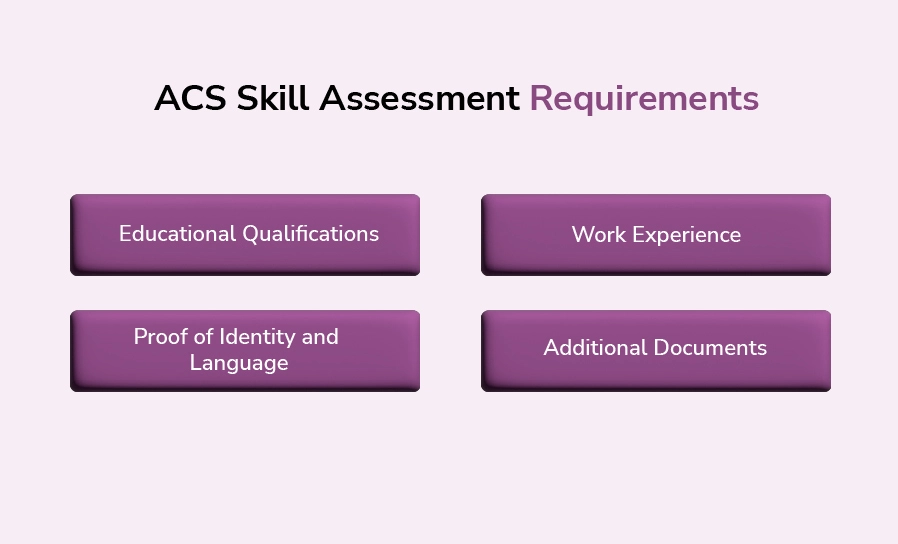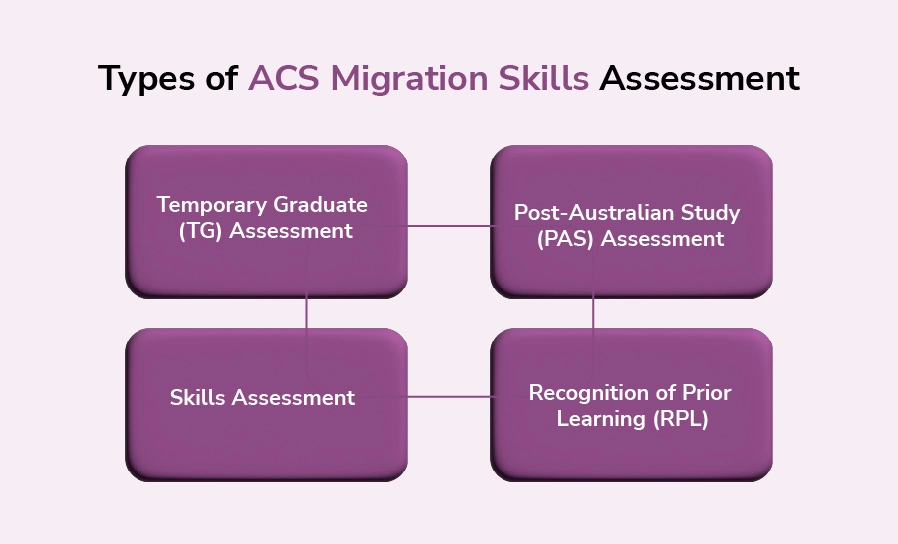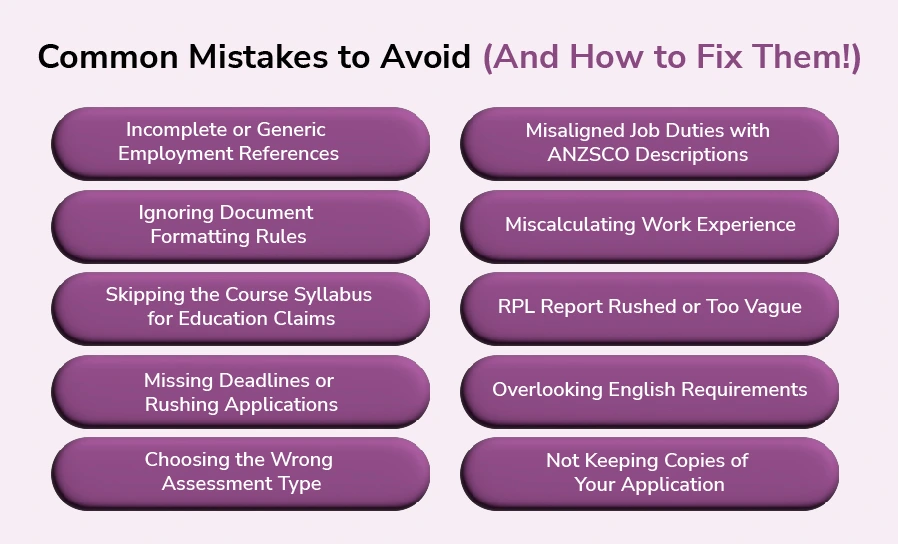What Is ACS Skills Assessment? A Simple Explanation.

What Is ACS Skills Assessment? A Simple Explanation.
If you’re an IT professional looking to migrate to Australia, the ACS Skills Assessment is a crucial step. The Australian Computer Society (ACS) evaluates your educational qualifications and work experience to determine your eligibility for skilled migration under the General Skilled Migration (GSM) programme.
This guide breaks down the ACS Migration Skills Assessment into bite-sized pieces, covering everything from ACS skill assessment requirements to ACS skill assessment fees. Let’s simplify this critical step in your Australian migration journey! 🚀
📌 What is the ACS Skills Assessment?
The Australian Computer Society (ACS) is the official authority that assesses the skills and qualifications of IT professionals seeking to work or migrate to Australia. The ACS Skills Assessment is a mandatory evaluation for anyone applying for a skilled migration visa (like Subclass 189, 190, or 491) in the IT sector.
Think of it as a quality check 🔍 to ensure your education, work experience, and expertise align with Australia’s industry standards. You can’t proceed with your visa application without a positive ACS assessment.
Why does Australia require this?
Australia’s tech industry is booming, and the government wants to ensure migrants possess the right skills to contribute effectively. The ACS acts as a gatekeeper, maintaining high standards for the sector.
Who Needs an ACS Migration Skills Assessment?
The ACS assessment isn’t for everyone—it’s specifically tailored for IT professionals. You’ll need it if:
- You’re applying for a Skilled Migration Visa (subclasses 189, 190, 491).
- Your nominated occupation is on the Skilled Occupation List (SOL) for IT roles (e.g., software engineer, data analyst, ICT project manager).
- You’re a recent IT graduate applying for a Temporary Graduate Visa (subclass 485).
Even if you’re a seasoned IT expert with decades of experience, you must go through the ACS process. No shortcuts! 😅
ACS Skill Assessment Requirements

The ACS skill assessment requirements vary based on your education, work experience, and the type of visa you’re applying for. Let’s simplify:
1. Educational Qualifications 🎓
-
- Degree Holders: A bachelor’s or master’s degree in IT or a closely related field.
- Non-IT Graduates: If your degree isn’t in IT, you’ll need additional qualifications or relevant work experience.
- Diploma/Certificate Holders: Vocational qualifications may be accepted but often require more work experience.
2. Work Experience 💼
-
- Post-Qualification Experience: The ACS typically requires 2-8 years of work experience in your nominated occupation, depending on your qualifications.
-
- Example: If you have an Australian IT degree, you may need 1 year of experience. Non-IT graduates need 6-8 years.
-
- Relevance: Your job duties must closely match the ANZSCO description of your nominated role.
- Post-Qualification Experience: The ACS typically requires 2-8 years of work experience in your nominated occupation, depending on your qualifications.
3. Proof of Identity and Language �🗣️
-
- Passport bio-data page.
- English proficiency test results (if required).
4. Additional Documents 📂
-
- Detailed employment references (on company letterhead).
- Academic transcripts and course syllabuses.
- For RPL (Recognition of Prior Learning): A portfolio proving your skills if you lack formal qualifications.
⚠️ Pro Tip: Always check the latest ACS guidelines—requirements can change!
Types of ACS Migration Skills Assessment

The ACS offers multiple pathways based on your background:
1. Temporary Graduate (TG) Assessment 🎓
This is for international students who have completed an Australian IT degree and are applying for a subclass 485 visa.
2. Post-Australian Study (PAS) Assessment
This is for graduates with Australian IT qualifications seeking permanent residency.
3. Skills Assessment 🔧
This is for offshore applicants with formal IT qualifications and work experience.
4. Recognition of Prior Learning (RPL) 🌟
This is for professionals without IT degrees but with significant industry experience (requires a detailed project report).
ACS Skill Assessment Fees – What’s the Damage? 💸
Let’s talk money! The ACS assessment fee varies depending on your application type:
| Application Type | ACS Skills Assessment Fee (AUD) |
| Temporary Graduate (TG) | $475 |
| Post-Australian Study (PAS) | $530 |
| Skills Assessment | $530 |
| RPL Application | $530 |
🔔 Note: Fees are non-refundable, even if your application is rejected. Double-check your eligibility before paying!
Step-by-Step ACS Application Process
Ready to apply? Here’s how it works:
-
- Prepare Documents: Gather transcripts, references, and ID proofs.
- Create an ACS Account: Register on the ACS online portal.
- Fill out the application form: Select your assessment type and upload documents.
- Pay the ACS Assessment Fee: Use a credit/debit card.
- Submit and Track: Wait for updates via email.
⏳ Processing Time: 6–12 weeks (longer for RPL applications).
What Happens After Submission?
You’ll receive one of three outcomes:
Positive Assessment 🎉: Congrats! Valid for 2 years.
Negative Assessment 😞: You can appeal or reapply after addressing gaps.
Request for More Info 📩: Submit additional documents promptly.
📌 Common Mistakes to Avoid (And How to Fix Them!) 🔍

Navigating the ACS Skills Assessment can feel like walking through a maze 🧩—one wrong turn, and your application might hit a dead end. To help you steer clear of pitfalls, here’s an expanded list of common mistakes applicants make, along with tips to avoid them:
1. Incomplete or Generic Employment References 📝
The Mistake: Submitting references that lack detail or fail to meet ACS standards.
❌ Missing company letterhead, manager’s contact details, or official signatures.
❌ Vague job descriptions like “managed IT tasks” instead of specific duties.
❌ Not stating employment duration (start/end dates) or hours worked per week.
How to Fix It:
✅ Ensure references are signed, dated, and on company letterhead.
✅ Mirror the ANZSCO job duties for your nominated role (e.g., “designed and tested software modules using Java” for a Software Engineer).
✅ Include key details: full-time/part-time status, projects, technologies used, and achievements.
2. Misaligned Job Duties with ANZSCO Descriptions 🎯
The Mistake: Assuming your job title alone matches the ANZSCO code.
❌ Writing duties that don’t reflect the exact tasks listed under your ANZSCO occupation.
❌ Overlooking “minor” tasks that ACS deems critical (e.g., not mentioning “client collaboration” for an ICT Business Analyst).
How to Fix It:
✅ Study the ANZSCO database (search your occupation code, e.g., 261313 for Software Engineer).
✅ Use keywords and phrases from the ANZSCO description in your references.
✅ Provide examples of projects that align with these tasks.
3. Ignoring Document Formatting Rules 📑
The Mistake: Submitting blurry scans, uncertified documents, or incorrect file types.
❌ Sending non-English documents without NAATI-certified translations.
❌ Forgetting to certify copies of degrees/passports (required for non-digital submissions).
❌ Uploading files in unsupported formats (e.g., HEIC instead of PDF)
How to Fix It:
✅ Follow the ACS document checklist like a bible.
✅ Use a scanner app (e.g., Adobe Scan) for clear, legible copies.
✅ Certify documents through a Justice of the Peace or authorised officer.
4. Miscalculating Work Experience ⏳
The Mistake: Assuming all your work experience counts.
-
- ❌ Overlooking ACS’s deduction rules:
-
- 2–4 years deducted if your degree isn’t ICT-related.
- 4–6 years deducted for diploma holders.
-
- ❌ Claiming internships or unpaid roles as “skilled experience”.
- ❌ Overlooking ACS’s deduction rules:
How to Fix It:
✅ Use the ACS employment calculator to determine eligible years.
✅ Only count post-qualification, paid, and relevant roles (20+ hours/week).
5. Skipping the Course Syllabus for Education Claims 🎓
The Mistake: Submitting transcripts without a detailed syllabus.
❌ Assuming ACS knows your university’s curriculum.
❌ Not highlighting ICT-related subjects for non-IT degrees.
How to Fix It:
✅ Attach a syllabus outlining course content, duration, and learning outcomes.
✅ Bold or highlight ICT subjects (e.g., Database Management, Programming).
6. RPL Report Rushed or Too Vague 📋
The Mistake: Treating the Recognition of Prior Learning (RPL) application as an afterthought.
❌ Writing generic project summaries without technical depth.
❌ Failing to link projects to the ACS Core Body of Knowledge.
How to Fix It:
✅ Structure your RPL report into two sections:
-
-
-
- Key Areas of Knowledge: Explain how you meet ACS’s ICT fundamentals.
- Project Reports: Describe 2–3 major projects, including your role, tools used, and challenges solved.
-
- ✅ Use diagrams, code snippets, or system architectures to showcase expertise.
-
7. Missing Deadlines or Rushing Applications ⏰
The Mistake: Waiting until the last minute to apply.
❌ Not accounting for ACS’s 8–12 week processing time (longer for RPL).
❌ Forgetting that visa applications can’t proceed without the assessment.
How to Fix It:
✅ Start gathering documents 6 months before your planned visa submission.
✅ Set reminders for follow-ups if ACS requests additional info.
8. Overlooking English Requirements 🗣️
The Mistake: Assuming ACS doesn’t care about English proficiency.
❌ Skipping IELTS/PTE if your passport isn’t from an exempt country (e.g., UK, USA).
How to Fix It:
✅ Check the Home Affairs website for English requirements tied to your visa.
✅ Submit language test results upfront if your education wasn’t in English.
9. Choosing the Wrong Assessment Type ❌
The Mistake: Selecting “Skills Assessment” instead of the “Post-Australian Study” pathway.
❌ Confusing Temporary Graduate vs. Permanent Residency applications.
How to Fix It:
✅ Double-check the ACS eligibility criteria for your visa subclass.
✅ When in doubt, email ACS for clarification before applying.
10. Not Keeping Copies of Your Application 📂
The Mistake: Assuming ACS will return your documents.
❌ Losing access to submitted files if you need to reapply or appeal.
How to Fix It:
✅ Save digital and physical copies of every document, payment receipt, and ACS communication.
Conclusion
The ACS Migration Skills Assessment is a crucial step in your Australian dream. While the process may seem daunting, understanding the ACS skill assessment requirements and ACS skills assessment fees upfront will save you time and stress.
Start early, double-check everything, and consult a migration agent when in doubt. Before you know it, you’ll be sipping coffee in Sydney or exploring Melbourne’s tech hubs! ☕
FAQ
1. What is the processing time for an ACS Skills Assessment? ⏳
The ACS typically takes 8–12 weeks to process standard applications. However, RPL (Recognition of Prior Learning) applications may take longer (up to 14 weeks). Always apply well in advance of your visa deadline!
2. How long is an ACS Skills Assessment valid? 📅
A positive ACS assessment is valid for 2 years from the date of issue. If your visa application is delayed beyond this period, you’ll need to renew your assessment.
3. Can I appeal a negative ACS assessment? 🚨
Yes! If your application is rejected, you can:
-
- Request a review (within 60 days) by addressing the gaps ACS highlighted.
- Submit a new application with updated documents.
4. Does ACS accept freelance or self-employed work experience? 💻
Yes, but you must provide strong evidence, such as:
-
- Client contracts or invoices.
- Bank statements showing payments.
- Statutory declarations from clients confirming your role and duties.
5. What documents do I need for the ACS Skills Assessment? 📄
The core documents include:
-
- Passport bio-data page.
- Degree certificates and transcripts (with course syllabus if your degree isn’t IT-related).
- Employment references (on company letterhead).
- For RPL: Project reports and a self-assessment against ACS’s Core Body of Knowledge.
6. Do I need to take an English test for ACS? 🗣️
The ACS itself does not require English test results. However, your visa application might (e.g., IELTS or PTE for Subclass 189/190). Check the Home Affairs requirements!
7. Can I apply for an ACS assessment while outside Australia? 🌏
Absolutely! The ACS Skills Assessment is open to both onshore and offshore applicants. The process is identical, but ensure your documents are translated if not in English.
8. What happens if I make a mistake in my application? 😟
Contact ACS immediately via their portal. Minor errors (e.g., typos) can sometimes be fixed, but major issues (e.g., incorrect assessment type) may require a new application and fee.